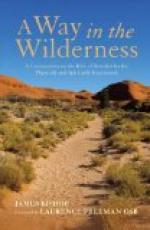Bye, baby bunting,
Daddy’s gone a hunting,
For to catch a rabbit skin
To wrap the baby bunting in.
Presently I began to sing it aloud. It cheered one up in the storm, and the lilt of it kept time to the leaping kind of gallop which is the easiest way to run on snowshoes: “Bye, baby bunting; bye, baby bunting—Hello!”
A dark mass loomed suddenly up before me on the open barren. The storm lightened a bit, before setting in heavier; and there were the caribou just in front of me, standing in a compact mass, the weaker ones in the middle. They had no thought nor fear of me apparently; they showed no sign of anger or uneasiness. Indeed, they barely moved aside as I snowshoed up, in plain sight, without any precaution whatever. And these were the same animals that had fled upon my approach at daylight, and that had escaped me all day with marvelous cunning.
As with other deer, the storm is Megaleep’s natural protector. When it comes he thinks that he is safe; that nobody can see him; that the falling snow will fill his tracks and kill his scent; and that whatever follows must speedily seek cover for itself. So he gives up watching, and lies down where he will. So far as his natural enemies are concerned, he is safe in this; for lynx and wolf and panther, seek shelter with a falling barometer. They can neither see nor smell; and they are all afraid. I have often noticed that among all animals and birds, from the least to the greatest, there is always a truce when the storms are out.
But the most curious thing I ever stumbled into was a caribou school. That sounds queer; but it is more common in the wilderness than one thinks. All gregarious animals have perfectly well defined social regulations, which the young must learn and respect. To learn them, they go to school in their own interesting way.
The caribou I am speaking of now are all woodland caribou—larger, finer animals every way than the barren-ground caribou of the desolate unwooded regions farther north. In summer they live singly, rearing their young in deep forest seclusions. There each one does as he pleases. So when you meet a caribou in summer, he is a different creature, and has more unknown and curious ways than when he runs with the herd in midwinter. I remember a solitary old bull that lived on the mountain-side opposite my camp one summer, a most interesting mixture of fear and boldness, of reserve and intense curiosity. After I had hunted him a few times, and he found that




